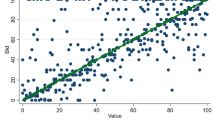Summary.
We investigate the pure-strategy Nash equilibria of asymmetric, winner-take-all, imperfectly discriminating contests, focussing on existence, uniqueness and rent dissipation. When the contest success function is determined by a production function with decreasing returns for each contestant, there is a unique pure-strategy equilibrium. If marginal product is also bounded, limiting total expenditure is equal to the value of the prize in large contests even if contestants differ. Partial dissipation occurs only when infinite marginal products are permitted. Our analysis relies heavily on the use of ‘share functions’ and we discuss their theory and application.
Similar content being viewed by others
Author information
Authors and Affiliations
Corresponding author
Additional information
Received: 28 May 2003, Revised: 26 April 2004,
JEL Classification Numbers:
C72, D72.
Correspondence to: Richard Cornes
Much of the research in this paper was undertaken while the first author was a Visiting Scholar at the Centre for Economic Studies, University of Munich. The support of the Centre is gratefully acknowledged.
Rights and permissions
About this article
Cite this article
Cornes, R., Hartley, R. Asymmetric contests with general technologies. Economic Theory 26, 923–946 (2005). https://doi.org/10.1007/s00199-004-0566-5
Issue Date:
DOI: https://doi.org/10.1007/s00199-004-0566-5




